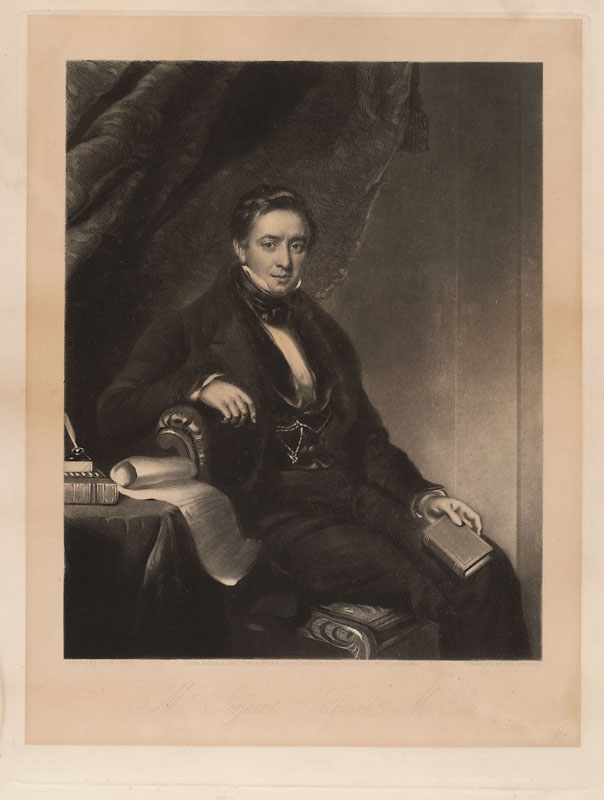- Thomas Noon Talfourd
Infobox Judge
honorific-prefix = Sir
name = Thomas Noon Talfourd
honorific-suffix = SL

imagesize =
caption =
office =
term_start =
term_end =
nominator =
appointer =
predecessor =
successor =
birth_date = birth date|1795|05|26
birth_place =Reading, Berkshire
death_date = death date and age|1854|03|13|1795|05|26
death_place =Stafford ,Staffordshire
nationality =
party =
otherparty =
spouse =
partner =
relations =
children =
residence =
alma_mater =
occupation =
profession =
net worth =
religion =
website =
footnotes =Sir Thomas Noon Talfourd, SL (
May 26 ,1795 –March 13 ,1854 ), was an Englishjudge andauthor .The son of a well-to-do brewer, he was born at
Reading, Berkshire (not, as is sometimes stated, at Doxey, near Stafford).He received his early education at
Hendon , and at the Reading grammar school. At the age of eighteen he was sent to London to study law under Joseph Chitty, thespecial pleader . Early in 1821 he joined the Oxford circuit, having been called to the bar earlier in the year. When, fourteen years later, he was created aserjeant-at-law , and when again he in 1849 succeeded Mr. Justice Coltman as judge of the Court of Common Pleas, he earned these distinctions more by his laborious care in the conduct of cases than for his brilliance in court.At the general election in 1835 he was elected MP for the
Parliamentary Borough of Reading , a result repeated in the general election of 1837. He chose not to run in the general election of 1841, but ran again in the general election of 1847 and was elected again. In the House of Commons he introduced aCopyright Bill in 1837; his speech on this subject was considered the most telling made in the House during that session. However, the dissolution of Parliament in 1837 following the death of William IV meant that the Bill had to be reintroduced in the new Parliament in 1838. By that time, the bill met with strong opposition and did not pass that year. Talfourd re-introduced the Bill again in 1839, 1840 and 1841, the Bill failing to pass in each of those years. It finally became law in 1842, albeit in a greatly modified form, and at a time when Talfourd was not in Parliament.Charles Dickens dedicated "The Pickwick Papers " to Talfourd.Literary work
In his early years in London Talfourd was dependent in great measure on his literary contributions. He was then on the staff of the "London Magazine", and was an occasional contributor to the "Edinburgh Review" and "Quarterly Review", the "New Monthly Magazine", and other periodicals; on joining the Oxford circuit, he acted as law reporter to "
The Times ". His legal writings on literary matters are excellent expositions, animated by a lucid and telling, if not highly polished, style. Among the best of these are his article "On the Principle of Advocacy in the Practice of the Bar" (in the "Law Magazine", January 1846); his "Proposed New Law of Copyright of the Highest Importance to Authors" (1838); "Three Speeches delivered in the House of Commons in Favour of an Extension of Copyright" (1840); and his famous "Speech for the Defendant in the Prosecution, the Queen v. Moxon, for the Publication of Shelley's Poetical Works" (1841).Talfourd had no position among men of letters until the production of his tragedy "Ion", privately printed in 1835 and produced the following year at
Covent Garden theatre. The tragedy was also well received in America, and was reproduced atSadler's Wells Theatre in December 1861. This dramatic poem, its author's masterpiece, turns upon the voluntary sacrifice of Ion, king ofArgos , in response to theDelphi c oracle, which had declared that only with the extinction of the reigning family could the prevailing pestilence incurred by the deeds of that family be removed.Two years later, at the
Haymarket Theatre , "The Athenian Captive" was acted with moderate success. In 1839 "Glencoe , or the Fate of the Macdonalds", was privately printed, and in 1840 it was produced at the Haymarket; but this home drama is inferior to his two classic plays. The "Cash/ian" (1853) did not excite much interest. Before this he had produced various other prose writings, among them his History of Greek Literature, in the "Encyclopaedia Metropolitana".In addition to the writings above-mentioned, Talfourd was the author of "The Letters of
Charles Lamb , with a Sketch of his Life" (1837); "Recollections of a First Visit to the Alps" (1841); "Vacation Rambles and Thoughts, comprising recollections of three Continental tours in the vacations of 1841, 1842, and 1843" (2 vols., 1844); and "Final Memorials of Charles Lamb" (1849–50).Talfourd died in 1854 in court at
Stafford during the performance of his judicial duties [GRO Register of Deaths: MAR 1854 6b 13 STAFFORD - Sir Thomas Noon Talfourd, age unspecified] . Dickens was amongst the mourners at his funeral atWest Norwood Cemetery .References
*1911
Wikimedia Foundation. 2010.
